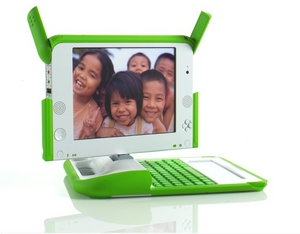The OLPC Wiki
| english | عربي | پښتو | български | deutsch | español | français | kreyòl ayisyen | italiano | 日本語 | 한국어 | монгол | Bahasa Melayu | नेपाली | norsk | português | română | русский | kinyarwanda | türkçe | 中文 | 繁體中文 | HowTo [ID# 50154] +/- |
Welcome to the OLPC Wiki, home to collaborative notes about the One Laptop per Child project and related projects and communities. We currently have 9,909 pages and roughly two-thousand registered contributors; please join us and share your ideas. There is also a non-wiki laptop.org.
What's new
- OLPC wins the Bridging Nations Bridge Builder Award: Technological Innovation for Bridging Digital Divide.
- Add an OLPC badge to your website.
- A report from OLPC in Nigeria: School Galadima
- New milestone: working autonomous mesh operation while the XO is suspended.
- B3 machines arrived at the OLPC offices in Cambridge on Friday. These machines, which are close to final, feature the Geode LX processor, improved keyboard and touch pad, many electrical and mechanical enhancements, and a brightly colored XO logo on the back. First impression: Wow!
- Latest release: The new stable build, Build 406, and a new firmware release, Q2C18, are available. Please update your machines. The autoreinstallation image makes this easy; you'll find many improvements in virtually all system functions (Release notes). Directions for Customizing NAND images have been added to the wiki.
- Localization: The Spanish translation of www.laptop.org is now on line, thanks to the tireless efforts of Xavier Alvarez. The templates for adding additional languages can be found at Localization/www.laptop.org. The Simplified Chinese translation is also on line, thanks to Scott Zhu; as is the Portuguese translation, thanks to Paulo Drummond; and the Korean translation, thanks to Do Young-Min, 도 영민.
- B2 machines are being distributed to developers who have joined the Developers Program. Those without machines can still run emulators on their current computers. If you have a machine, please see the BTest-2 Release Notes and B1 and B2 Demo Notes. B1 Release Notes can still be found here.
Weekly updates can be found in Current events.
About One Laptop per Child
- It's an education project, not a laptop project.
This is the wiki for the One Laptop per Child association. The mission of this non-profit association is to develop a low-cost laptop—the "$100 Laptop"—a technology that could revolutionize how we educate the world's children. Our goal is to provide children around the world with new opportunities to explore, experiment, and express themselves.
Why do children in developing nations need laptops? Laptops are both a window and a tool: a window into the world and a tool with which to think. They are a wonderful way for all children to learn learning through independent interaction and exploration.
OLPC espouses five core principles: (1) child ownership; (2) low ages; (3) saturation; (4) connection; and (5) free and open source.
More on the Laptop and OLPC's vision for learning.
What you'll find inside
A good place to start exploring this wiki is the One Laptop per Child page, which gives an overview of the project. There is a list of frequently asked questions (FAQ); a place to ask a question; and numerous pages on hardware, software, content, and the developers program—and a separate wiki for software development. Sugar is a novel interface with its own interface guidelines. There are also discussion pages on issues of deployment and country-specific discussions. An extended table of contents is also available. The latest build is always available here. The latest stable build is always available here.
About this wiki
The purpose of this wiki is to both share information about the project and to solicit ideas and feedback. The articles and discussion vary from technical to epistemological. We invite comments on every page (please use the "discussion" tab at the top of each page). Please restrict edits to the article pages themselves to facts, not opinions. You are encouraged to sign your work and to make liberal use of citations and links. (Please make an account and please use ~~~~ as a signature for your comments.) Please note that pages that include the {{OLPC}} template—such as this one—are maintained by the OLPC team and are generally representative of the current state of the project. Other pages—created and maintained by the public—should be read with that in mind.
